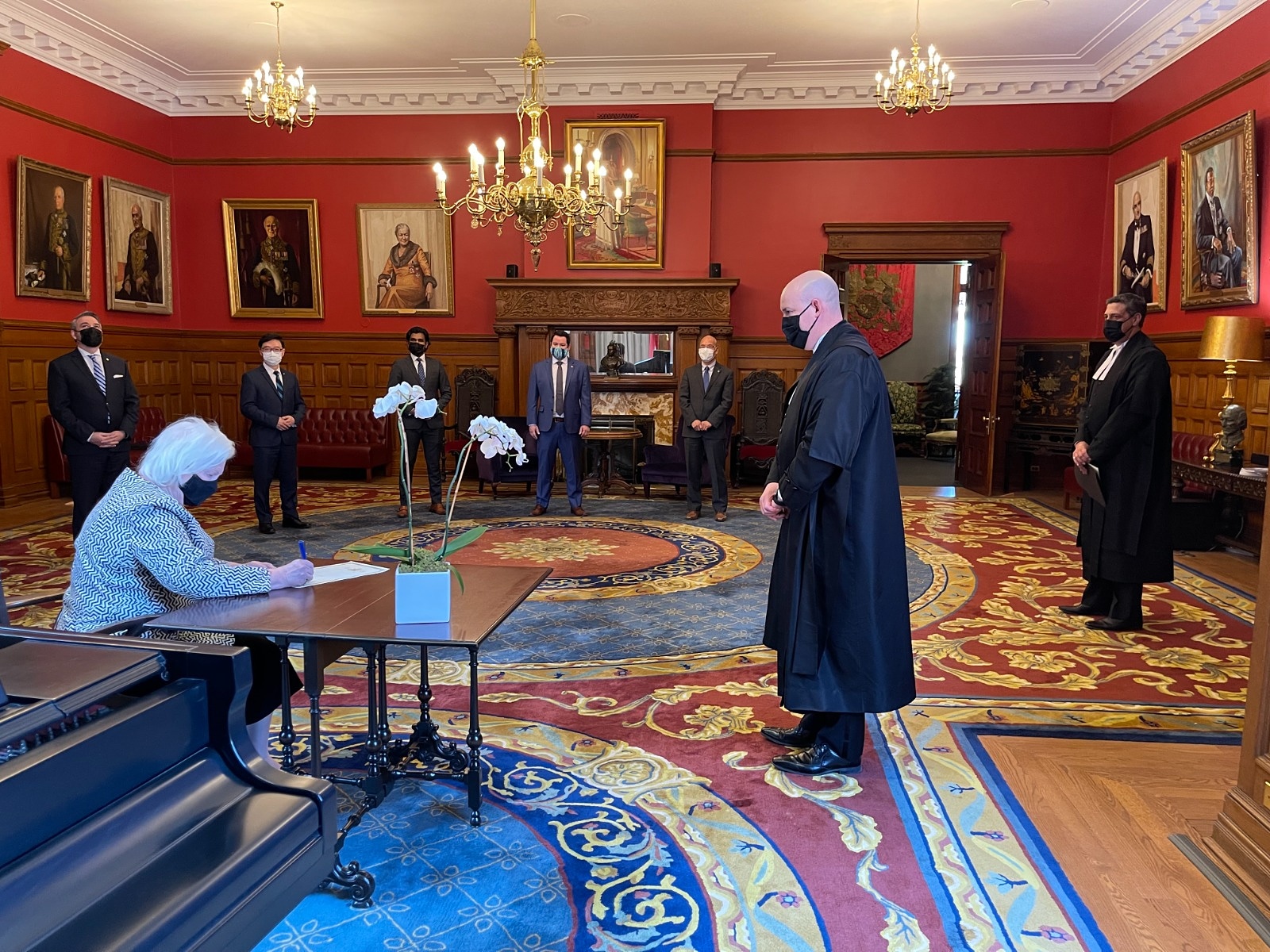
The Tamil Genocide Education BIll being signed last year.
The province of Ontario’s lawyers effectively argued to dismantle the legal case filed against Bill 104 – the “Tamil Genocide Education Week Act”, at the Superior Court of Ontario by Tamil Genocide deniers.
It is a well-known fact that the Sri Lankan government is working extremely hard against any efforts undertaken in the struggle for justice for Tamil people in Sri Lanka and around the world. Even today despite facing an economic crisis, triggering political and financial instability, the Sri Lankan government continue to engage in Tamil Genocide denial and distortion.
In Canada, the Tamil Genocide deniers has filed a case against Bill 104 – the Tamil Genocide Education Week Act, at the Superior Court of Ontario, saying that the bill is unconstitutional and violates the Charter of Rights and Freedoms. This bill was brought forward by MPP Vijay Thanigasalam and unanimously passed May 21, 2021 in the midst of great challenges. This case was taken up for hearing on May 24th.
The Tamil Genocide Education Week Act (Bill 104) proclaims the seven-day period in each year ending on May 18th as Tamil Genocide Education Week. During this week, Ontarians are encouraged to educate themselves about and maintain their awareness of, the Tamil genocide and other genocides that have occurred in world history.
The opposing party argued that the Ontario provincial government is within the Canadian federal government and therefore has no right to talk about matters pertaining to foreign affairs such as genocide. They further argued that the Ontario provincial government’s passing of the Tamil Genocide Education Week Act was wrong as the Government of Canada did not officially recognize the genocide of Tamils.
The Ontario government’s lawyers who argued for defending the legitimacy of the Tamil Genocide Education Week did an excellent job citing several examples to prove that the “Tamil Genocide Education Week Act” is in fact legal and that the Ontario government has the authority to pass the act. In particular, they argued well that the act was passed to educate the people of Ontario regarding the Tamil Genocide, and that the government of Ontario did not violate any legal framework in passing the Bill-104.
It is important to note here that according to the Canadian federal and provincial structures, education rests within the responsibility of the provincial government and foreign policy matters rest within the responsibility of the federal government. The opposing party here argues that the provincial government’s interference in matters within the responsibility of the federal government is against the structural framework of Canadian politics.
The Tamil Genocide Education Week Act definitely recognizes the genocide. In legal terms, the declaration wasn’t “legally binding” in the sense that it wasn’t a referral to the International Court of Justice or a criminal indictment of anyone. It is a declaration. During the nearly 10-hour debate, the lawyers representing the Province of Ontario effectively argued and defended the Tamil Genocide Education Week act within the legal framework of Ontario’s constitution.
The Ontario’s Minister of Education, Stephen Lecce, has provided funding for workshops to address healing from the intergenerational trauma caused by the Tamil Genocide. Lecce also spoke on May 18th at the Tamil Genocide Remembrance Day Vigil as the Tamil community remembered and honoured the innocent victims of the Tamil genocide. He stressed the significance of Tamil Genocide Education Week and its importance of education in healing from trauma.
There is misinformation being spread on social media without context that only states parts of the argument by the Ontario lawyers. It is extremely essential that during such crucial times, the people understand the legal case and identify who the opposers vs the defenders are.
Tamil Genocide Education Week, Act educates Ontarians about the genocide that were committed against the Tamil people by the state of Sri Lanka. This act has already been passed by Ontario’s legislative assembly and received royal assent. Now the Tamil Genocide deniers are challenging this act in court. The Ontario government is defending the act.
The final verdict on this case is not out yet. A case like this, under normal circumstances will take up to three to six months.
_____
Melvin Mariathas is a human rights advocate and political organizer involved in Tamil rights and Canadian policy issues.
